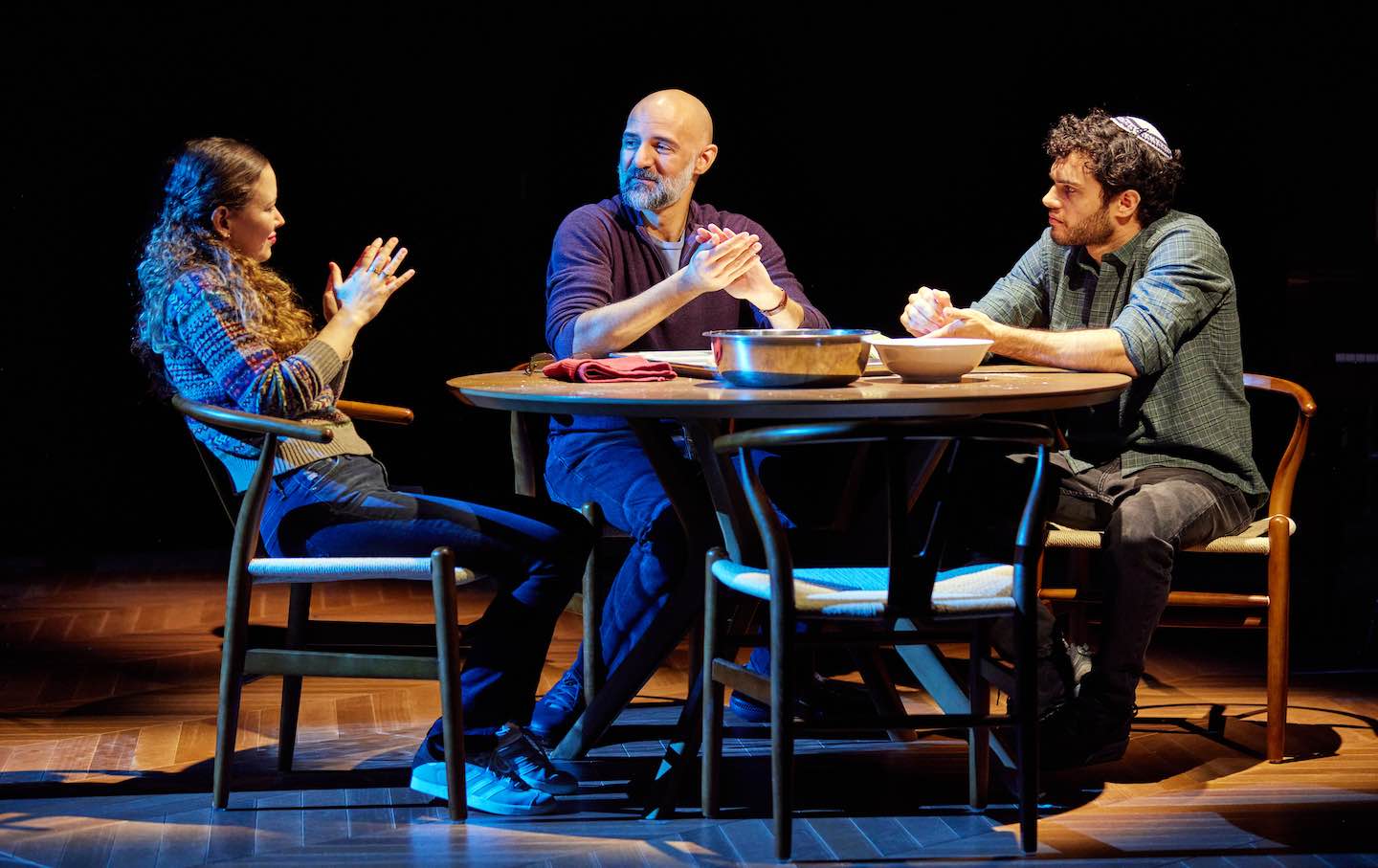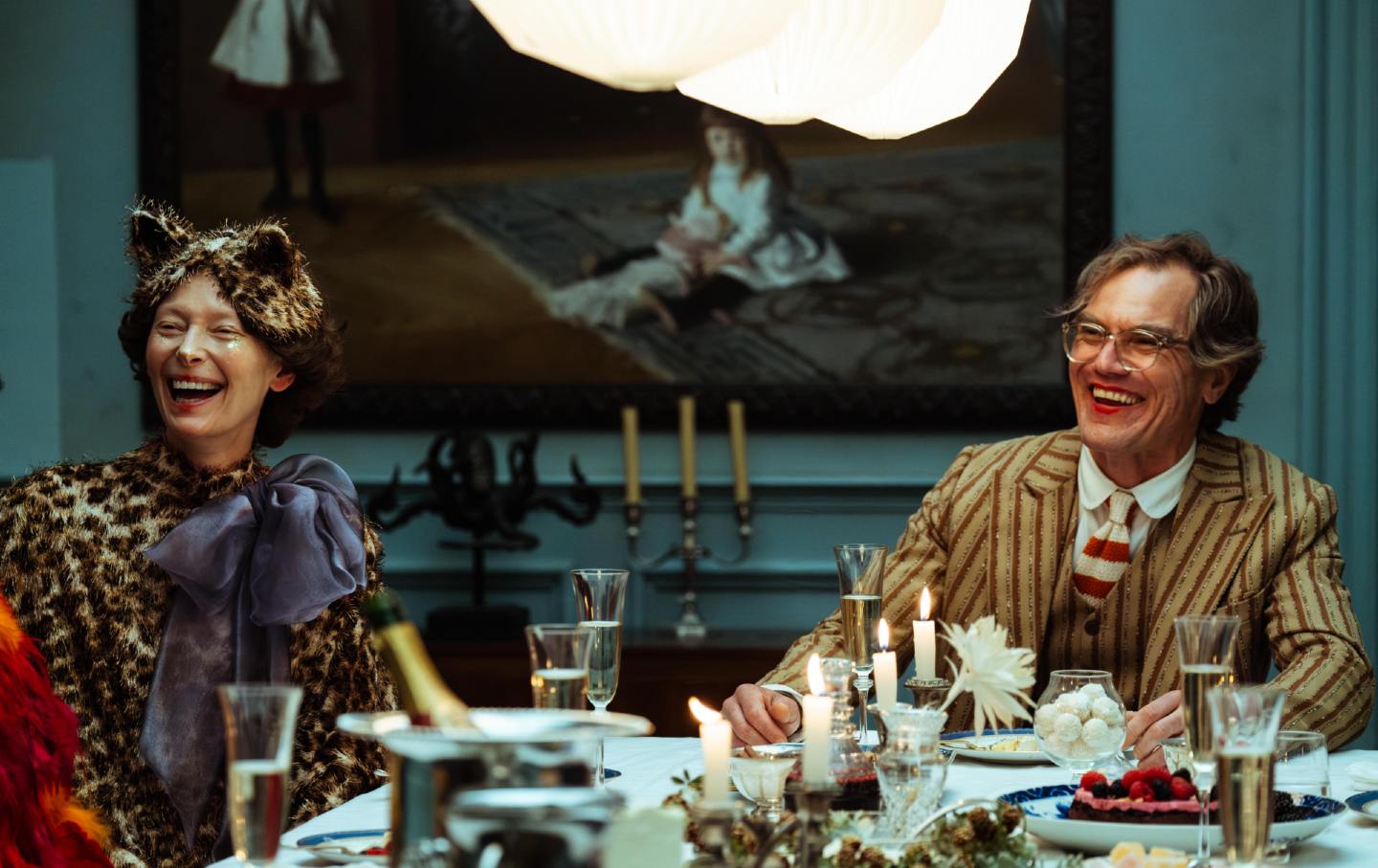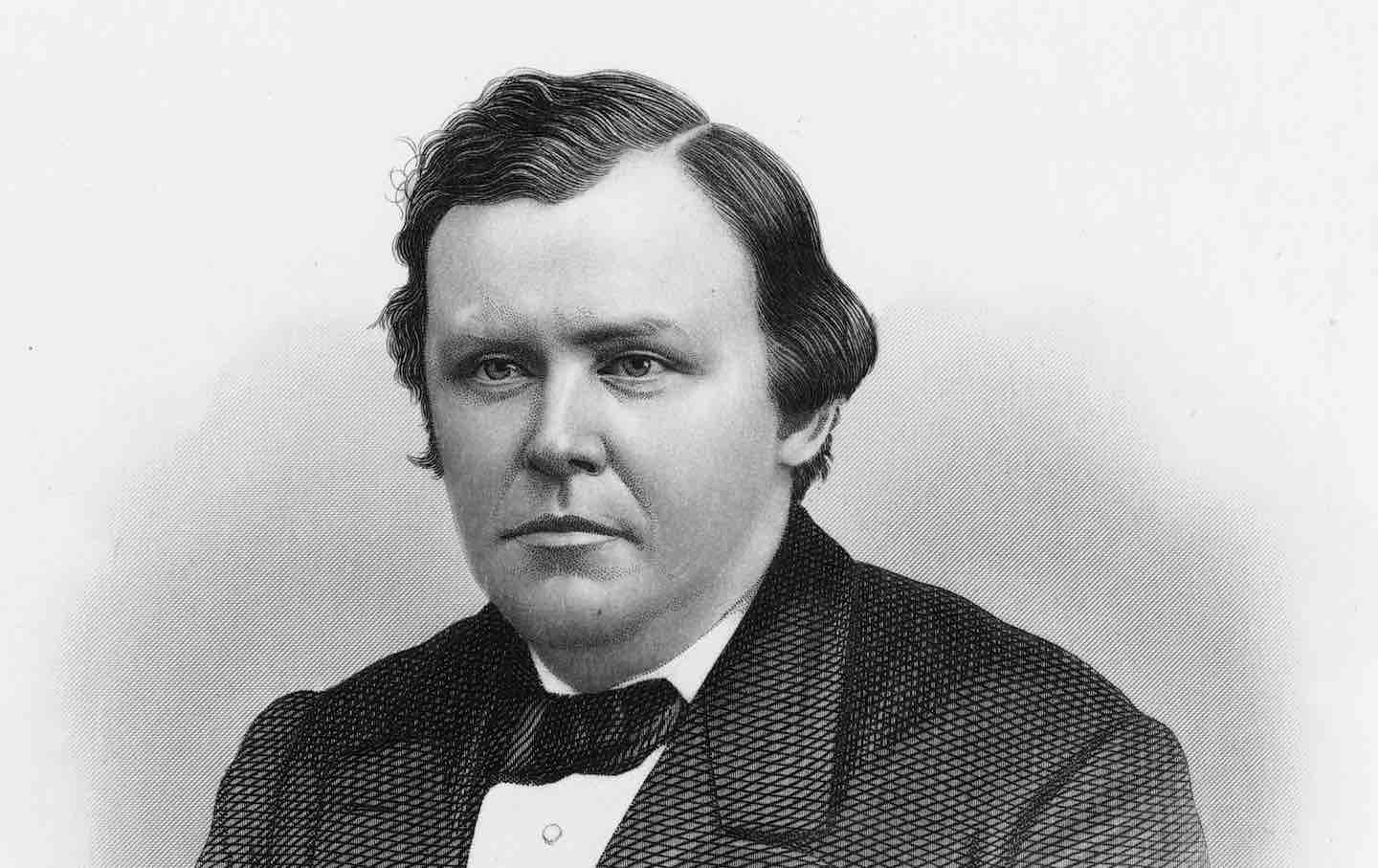A Broadway Play’s Clumsy Intervention Into Antisemitism
Prayer for the French Republic is among a spate of recent dramas devoted to the precarity of Jewish life at the expense of solidarity.

Molly Ranson, Nael Nacer, and Aria Shahghasemi in Prayer for the French Republic.
(Photo by Jeremy Daniel)In Joshua Harmon’s play Prayer for the French Republic, a young French woman, Elodie, argues about Israel with Molly, a distant cousin from the United States who is visiting Paris. When Molly mildly observes that like the US and Germany, Israel too has “done wrong,” Elodie pounces: “I was wondering how long I’d have to wait for the Israeli-Nazi comparisons,” she says, “but it’s right on time!” The exchange comes toward the end of the first of three hour-long acts, but Harmon doesn’t make his audience wait nearly as long to draw his own, inverted Nazi comparison: From the start, the proposition that storm troopers, always and everywhere, lie in wait just outside any Jew’s door is baked into the very structure and substance of this troublesome drama, which recently completed a run on Broadway.
The play joins a long line of English-language theatrical works that (like innumerable creations in other genres) address the Holocaust or antisemitism more generally. Last year’s Broadway season alone saw critically acclaimed productions of Tom Stoppard’s Leopoldstadt, which follows the demise of a well-to-do Viennese Jewish family from 1899 to 1955; Alfred Uhry and Jason Robert Brown’s musical Parade, which recounts the arrest and 1915 lynching of Leo Frank in the American South; and Just for Us, in which the stand-up comic Alex Edelman hilariously describes his undercover visit to a white nationalist meeting in Queens.
The current Broadway season has brought, along with Harmon’s play, Bruce Sussman and Barry Manilow’s Harmony, tracing an all-male German musical ensemble, the Comedian Harmonists (half of whose members were Jewish), from soaring success in the Weimar period to ruin under Nazism. Meanwhile, the New York premiere of the Polish playwright Tadeusz Słobodzianek’s Our Class just completed a run in Brooklyn. Beginning in 1925, the play chronicles the lives, over several decades, of 10 schoolmates—five Jewish, five Polish—as their adolescent games and flirtations morph into betrayals, brutality, and an occasional humane action. The play was inspired by Jan Gross’s Neighbors: The Destruction of the Jewish Community in Jedwabne, Poland, which demonstrated that the local Poles—not the long-blamed Nazi occupiers—were responsible for murdering nearly all the town’s Jews in 1941 by locking them in a barn and setting it ablaze.
Taken on its own, each of these recent productions offers qualities to admire as well as aspects to quibble with. In the aggregate, though, as diverse as they are in style, focus, and tone, they represent an astonishing fixation with Jewish precarity. As a result, they flow into a disquieting discourse familiar to anyone on the mass-mailing list of the ADL, whose regular fundraising missives warn urgently about the rise of antisemitism (which seems to have been “on the rise” for at least the several decades I’ve been receiving such letters). Playwrights understandably tend to focus on ruptures rather than continuities, exclusion rather than integration: the stuff of dramatic conflict. Still, it’s hard to miss how producers in the last couple of years have favored Jewish-themed work that—to invoke the influential phrase coined by the historian Salo Baron in 1928—adheres to a “lachrymose conception of Jewish history,” making the very substance of Jewish narrative a recounting of persecution that ignores a far more multifaceted experience.
These productions—with the exception of Just for Us—depict Jews on their way to (or, by luck, evading) slaughter. To say so is hardly to discount the enormous, unshakable weight of the Holocaust or the odious persistence of antisemitism. Yet one can’t help noticing the lack of a parallel spate of works about Jewish life in all its joyous, fractious, vexing vibrancy. Unlike in decades past, in most of the works about Jews presented on major stages this year and last, what makes the characters Jewish is not anything that enriches their lives or enhances its meaning; what makes them Jewish is peril. And that, as a defining characteristic, feeds a teleology whose end point is Israel, the presumed safe haven for Jews. A preponderance of dramas about Jewish dread—regardless of the intentions of any individual playwright—unavoidably participates in this pervasive logic.
Prayer for the French Republic leaps into it headlong: It’s the only one of these recent plays that is explicitly—and emphatically—Zionist. Centered on a contemporary French Jewish family whose members grow increasingly panicked in the face of antisemitic incidents in the country, the play argues for immigration to Israel as their only viable countermeasure.
Prayer plays out in a bisected time frame, with half of it set in 2016–17 in the well-appointed Paris home of the Salomon-Benhamous, and the other half set in the 1940s during the Nazi occupation. In the near-present day, Elodie (Francis Benhamou—her matching surname is just a coincidence) is the pajama-clad, manic-depressive, adult daughter of a psychiatrist mother, Marcelle (Betsy Aidem). The hostility between the two places Prayer firmly in the American tradition of screeching, dysfunctional family dramas. (Despite her profession, Marcelle hurls mocking insults at Elodie about her mental illness.) Elodie’s seemingly mild-mannered father, Charles (Nael Nacer), is an Algerian Jewish émigré who tries to calm things down in the household—until his radar for ambient Jew-hatred is activated and his own fear ramps up. Meanwhile, the Salomon-Benhamous’ son, Daniel (Aria Shahghasemi), is a teacher in a Jewish school who, having recently become religious, wears a kippah, much to his mother’s distress. “Religion is not something to advertise,” she warns, urging him to add a baseball cap.
Early in Prayer, Daniel makes his entrance with a bloody nose; he has just been assaulted in the Muslim and Jewish suburb where he works. (Marcelle: “Who did this to you?” Charles: “You know who.”) The assault—along with the rise of Marine Le Pen and the shootings in a kosher supermarket that followed the Charlie Hebdo attack in 2015—ignites the play’s primary action: the family’s clamorous arguments over whether to move to Israel. Thin as matzah, the characters schematically represent different viewpoints.
A secondary source of tension—and of cheap laughs—comes in the form of Molly (Molly Ranson), who has just shown up to meet these umpteen-times-removed cousins while she is spending a college year abroad in Nantes. Molly is quickly established as the naïve butt of Harmon’s jokes. Her enthusiasm over a croissant—“Sorry, I just, I have never had anything this, uhm, good before? In my entire life?”—is meant to draw the same yuks as her woke liberal-arts-college interjections about Palestinians, which she is “just putting…out there in case it is helpful.” Elodie is always quick to eviscerate such remarks with contemptuous sarcasm: “I had no idea Israel’s occupation of Palestine was so problematic. Thank you so much for that.” In the second act, Elodie is given a whole scene devoted to haranguing Molly, a 15-minute tirade that, in its scattered way, hits all the major Zionist talking points: the impossibility of Jews finding security anywhere else; the left’s unwarranted (hence, antisemitic) obsession with Israel to the exclusion of worse human rights abusers; the right to defend the country against terrorists without restraint, just as the US did in Iraq. When Molly tries to interject—“Are you familiar with this thing called whataboutism?”—Elodie just bulldozes ahead.
The play’s 21st-century arguments over whether to stay or go—to demand equality and protection as French citizens, or to conclude that France will never really provide them—find a sort of reverse echo in the intercutting scenes set in the mid-1940s. In a more modest apartment that slides into view stage right on a turntable, Marcelle’s great-grandparents sit out the war (managing to remain in their own apartment because their building’s super told an investigating SS officer to leave the old couple alone). In expository episodes, we hear reports of the escape to Cuba of one of their adult children and the deportation of two more. After the liberation of the camps, one of them returns, broken, with his one surviving child—Marcelle’s future father. Nothing advances or deepens the action in these scenes; they work merely to evoke the Holocaust trauma that thrums in the breasts of the Salomon descendants seven decades later. And to cue it in ours.
Tying the two time periods together is Marcelle’s brother, Patrick (Anthony Edwards), who both comments on and enters the action, announcing its themes like a didactic narrator. A hard-core assimilationist who can barely tolerate sitting through a Passover seder with his sister’s family, he offers direct monologues recounting Jewish massacres through the ages. These help bring the play to its denouement, when Marcelle’s elderly and infirm father asks the assembled Salomon-Benhamous, who are about to depart for Israel (as some 5,000 French Jews did in 2016), “Why do they hate us?” Each family member chimes in, offering a litany of contradictory answers: because we’re rich, we’re poor, we’re capitalists, we’re communists, we killed Christ (or, at least, we don’t believe in Christ), we live in their countries, we have our own country, we survive.
The problem is not that this recital is false, but that it’s incomplete, not least because it positions Jews outside of history. To cite just one example, the play suggests that an Algerian Jew’s emigration in the 1960s was prompted by the same murderous hostility toward Jews as the Valentine’s Day Massacre of 1349 or the industrial genocide of the Holocaust, and had nothing to do with the Jewish Algerian alignment with France before and during the Algerian war for independence.
Popular
“swipe left below to view more authors”Swipe →Such agglomerating of Jewish persecution from across the centuries feels especially imprudent right now, while two terrible things about antisemitism are simultaneously true in the United States: The number of alarming incidents of antisemitism is climbing, and (as a culmination of years-long campaigns) false accusations of antisemitism are being successfully weaponized to stifle pro-Palestinian expression.
Of course, it’s not necessarily the job of the theater to untangle cases of hatred from protests against Zionist ideology and Israeli actions. Still, Prayer for the French Republic dramatizes—and ends up endorsing—a kind of traumatic narcissism that can only make matters worse. It prevents people from seeing beyond their own shivering skin to the torment of others—even when the authorities causing that torment do so in their name.
That the foremost impact of Jewish stories on our biggest stages these days is to set our skins shivering suggests a communal desire for affirmation of Jewish anxiety about antisemitism—or at least a supposition that tickets can be sold for valorizing that feeling—to the exclusion of myriad other stories. There are so many other possibilities in the history of the American stage (not to mention the Yiddish canon) and in work by contemporary playwrights, from David Adjmi (Stunning) to David Zellnik (Ariel Sharon Stands at the Temple Mount and Dreams of Theodor Herzl), that it’s impossible to name even a dozen examples without leaving out scores more: stories about Jewish families confronting class and race in America, about engaging with labor and other political movements, about love amid the storms of history, about everything. And musicals! In contrast, Broadway’s recent focus on the lachrymose—which predates the atrocities of October 7 and the relentless horrors that have followed—reflects and nourishes a bunker mentality, Prayer most of all.
When Charles announces toward the end of Act II that he is scared and wants to move to Israel, he asserts, without any pushback, that Jews eternally have only two options: “the suitcase or the coffin.” Of course, that leaves out the possibility of forging solidarity with other beleaguered minorities and pressing for change. What’s more, if that binary is true for anyone these days, it’s the Palestinians of Gaza. Except they don’t have anywhere to run—and they’re being buried without coffins.
More from The Nation

What Comes After the Apocalypse? A Q&A With Joshua Oppenheimer What Comes After the Apocalypse? A Q&A With Joshua Oppenheimer
Oppenheimer’s latest film, The End, is a Golden Age, postapocalyptic musical crying out from the depths of the earth.

The Peculiar Case of Ignatius Donnelly The Peculiar Case of Ignatius Donnelly
The Minnesota politician presents a riddle for historians. He was a beloved populist but also a crackpot conspiracist. Were his politics tainted by his strange beliefs?

The Agony of Aaron Rodgers The Agony of Aaron Rodgers
Is he the world’s most interesting athlete or is he just a washed-up crackpot?

Can You Understand Ireland Through One Family’s Terrible Secret? Can You Understand Ireland Through One Family’s Terrible Secret?
In Missing Persons, Clair Wills's intimate story of institutionalized Irish women and children, shows how a family's history and a nation’s history run in parallel.

Peter Schjeldahl’s Pleasure Principle Peter Schjeldahl’s Pleasure Principle
His art criticism fixated on the narcissism of the entire enterprise. But over six decades, his work proved that a critic could be an artist too.

How the Western Literary Canon Made the World Worse How the Western Literary Canon Made the World Worse
A talk with Dionne Brand about her recent book, Salvage, which looks at how the classic texts of Anglo-American fiction helped abet the crimes of capitalism, colonialism, and more...


